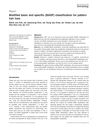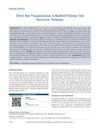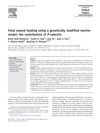 2 citations,
June 2019 in “International Journal of Dermatology”
2 citations,
June 2019 in “International Journal of Dermatology” The modified hair loss classification is more detailed but less user-friendly.
 2 citations,
January 2013 in “Türkiye klinikleri tıp bilimleri dergisi”
2 citations,
January 2013 in “Türkiye klinikleri tıp bilimleri dergisi” The study suggests using a score of 11 on the mFG scale to diagnose hirsutism in Turkish women, with adjustments for age, skin type, and family history.
 February 2024 in “Journal of cutaneous and aesthetic surgery”
February 2024 in “Journal of cutaneous and aesthetic surgery” The combined treatment helps improve severe hair loss and reduces the need for other medications.
 January 2017 in “Korean Journal of Pharmacognosy”
January 2017 in “Korean Journal of Pharmacognosy” Modified red ginseng extract promotes hair growth and has antioxidant and anti-inflammatory effects.
 October 2010 in “Journal of Drugs in Dermatology”
October 2010 in “Journal of Drugs in Dermatology” In 2010, Marco Toscani's team introduced a new scalpel for hair transplants that cuts parallel to hair follicles, reducing hair loss and improving on previous methods.
 63 citations,
February 2013 in “Human cell”
63 citations,
February 2013 in “Human cell” PEGL-DOX causes Hand-Foot Syndrome due to skin reactions from prolonged circulation and ROS generation.
 47 citations,
November 2012 in “Pharmaceutical research”
47 citations,
November 2012 in “Pharmaceutical research” Surface-modified nanoparticles mainly use non-follicular pathways to enhance skin permeation of ibuprofen and could improve treatment for inflammatory skin diseases.
22 citations,
July 2016 in “Cellular and Molecular Life Sciences” Genetic changes in mice help understand skin and hair disorders, aiding treatment development for acne and hair loss.
 18 citations,
February 2022 in “Cell Death Discovery”
18 citations,
February 2022 in “Cell Death Discovery” ECM1-modified stem cells can effectively treat liver cirrhosis.
 16 citations,
August 2014 in “Archives of Pharmacal Research”
16 citations,
August 2014 in “Archives of Pharmacal Research” Special nanoparticles increased skin absorption of hair loss treatments with fewer side effects.
 15 citations,
January 2013 in “Journal of Cutaneous and Aesthetic Surgery”
15 citations,
January 2013 in “Journal of Cutaneous and Aesthetic Surgery” The modified Direct Hair Transplantation method is effective for treating baldness with better graft survival and less damage than standard techniques.
 10 citations,
April 2008 in “Journal of Pediatric Surgery”
10 citations,
April 2008 in “Journal of Pediatric Surgery” P-selectin is not the only factor that prevents scarring in fetal wound healing in mice.
 9 citations,
July 2021 in “Frontiers in Pharmacology”
9 citations,
July 2021 in “Frontiers in Pharmacology” Cholesterol-modified siRNAs targeting certain genes increased hair growth in mice.
 8 citations,
May 2020 in “Anais Brasileiros de Dermatologia”
8 citations,
May 2020 in “Anais Brasileiros de Dermatologia” Higher levels of ischemia-modified albumin in telogen effluvium patients may indicate oxidative stress.
8 citations,
January 2019 in “Turkish journal of medical sciences” Ischemic modified albumin could be a new indicator of oxidative stress in people with alopecia areata.
 6 citations,
May 2022 in “Medicina-lithuania”
6 citations,
May 2022 in “Medicina-lithuania” IMA may indicate oxidative stress in skin and hair disorders, but more research is needed.
 3 citations,
January 2023 in “Dermatology Practical & Conceptual”
3 citations,
January 2023 in “Dermatology Practical & Conceptual” IMA and IMA/albumin levels don't predict alopecia areata severity.
 1 citations,
May 2023 in “Biochemical and Biophysical Research Communications”
1 citations,
May 2023 in “Biochemical and Biophysical Research Communications” Blocking DKK1 with siRNA can improve hair growth.
 1 citations,
December 2017 in “Turkderm”
1 citations,
December 2017 in “Turkderm” People with a family history of hair loss are more likely to experience it, and the severity of hair loss is linked to insulin resistance. The connection between early hair loss and oxidative stress needs more investigation.
 1 citations,
September 2016 in “Indian Journal of Plastic Surgery”
1 citations,
September 2016 in “Indian Journal of Plastic Surgery” The new hair follicle harvesting technique improves hair transplant results and makes the procedure quicker and easier to learn.
 April 2024 in “JCT research”
April 2024 in “JCT research”  November 2023 in “Journal of Dermatological Science”
November 2023 in “Journal of Dermatological Science” A new computer tool quickly measures hair thickness differences in people with common types of hair loss.
 September 2018 in “Plastic and reconstructive surgery. Global open”
September 2018 in “Plastic and reconstructive surgery. Global open” A new earlobe repair method using cartilage grafts showed high satisfaction and no re-splitting.
The modified stem cells with VEGF165 in a special scaffold improved blood vessel growth and wound healing for skin repair.
February 2023 in “Materials today bio” The treatment effectively promotes hair regrowth in androgenetic alopecia without causing skin irritation.
 104 citations,
November 1978 in “JAMA”
104 citations,
November 1978 in “JAMA” The Protein-Sparing Modified Fast is effective for rapid weight loss and maintaining it, but requires medical supervision and can have side effects.
 93 citations,
November 2018 in “Carbohydrate Polymers”
93 citations,
November 2018 in “Carbohydrate Polymers” New nanocomposites with copper show promise for healing burn wounds and regenerating skin.
 73 citations,
July 2013 in “The Journal of Sexual Medicine”
73 citations,
July 2013 in “The Journal of Sexual Medicine” Finasteride use changes brain chemicals, causing lasting sexual issues and anxiety/depression.
 14 citations,
November 1963 in “The journal of investigative dermatology/Journal of investigative dermatology”
14 citations,
November 1963 in “The journal of investigative dermatology/Journal of investigative dermatology” Pathologic tissues have more soluble proteins than normal tissues.

























